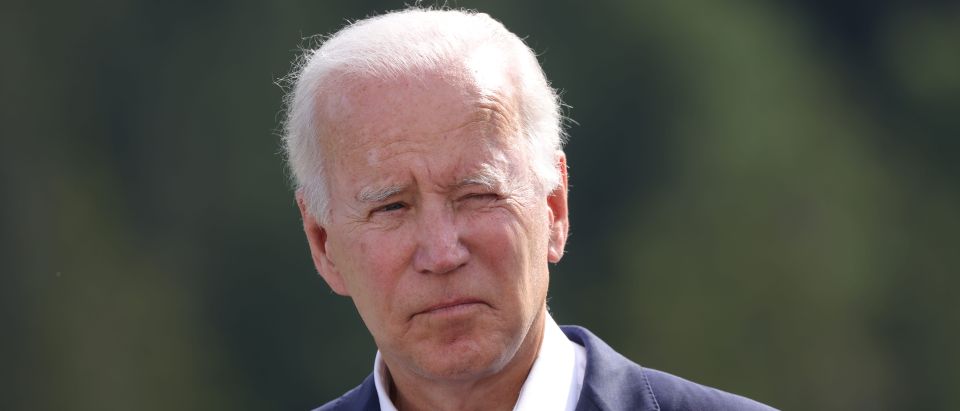The country is rapidly realizing that Joe Biden is a mediocre politician whose crowning achievement is his own ambition.
When Biden ran successfully for president the third time, he promised that he’d be different from Donald Trump. He has certainly delivered on that promise in ways that few expected.
Biden promised unity but has fostered division.
Biden promised competence but has delivered incompetence.
Biden promised foreign-policy experience but has repeatedly sent mixed messages to our friends, allies and enemies.
Biden promised clean energy solutions but has presided over the highest gasoline prices in the country’s history – along with rolling blackouts and uncontrolled forest fires.
When an American president is perceived as weak, bad things tend to happen to the country. In Biden’s case, his fundamental weakness became glaringly obvious with his disastrous Afghanistan withdrawal last August and has continued – even snowballed – ever since.
Biden has managed to achieve in 18 months what it took Lyndon Johnson a little over five years to accomplish: the alienation of most of the nation as well as that of his own political party.
Vice President Lyndon Johnson became president after John F. Kennedy’s assassination in November 1963. Given the timing of his ascendancy to the Oval Office, LBJ was eligible to complete JFK’s first term and then, if elected, serve two four-year terms in his own right.
LBJ trounced the GOP’s Barry Goldwater in November 1964, winning 61.1%of the popular vote, 44 states plus D.C., and 486 Electoral College votes to Goldwater’s 52. By early 1968, however, the Johnson presidency was over.
After escalating our presence in Vietnam and pursuing costly Great Society programs – a classic, unsustainable guns-and-butter fiscal policy – LBJ was facing significant domestic unrest. He realized his own political vulnerability. On March 31, 1968, in an evening address to the nation, he stunned the country when he announced that he would not seek or accept his party’s nomination for another term as president.
Biden’s 2020 victory came with a significant popular-vote majority – seven million more votes than Donald Trump received – but no coattails: the Senate was split 50-50, and House Speaker Nancy Pelosi enjoyed, at most, a 12-seat majority.
Biden is neither LBJ nor FDR. We would have realized his shortcomings much earlier had the aging candidate conducted a normal nationwide election campaign rather than citing the coronavirus pandemic as a reason for campaigning mostly from his Delaware basement.
Biden’s limitations have really been evident for decades but consistently ignored or excused. He’s been cited twice for plagiarism: once in law school and again in 1987 during his first presidential campaign. Serial plagiarizers plagiarize for a simple reason: they lack their own ideas.
After gaining the presidency, Biden offered no agenda of his own. Instead, he embraced most of Bernie Sanders’ prepackaged progressive policies. Biden studiously avoids substantive media appearances because he is unable to think and speak for himself without a teleprompter or being heavily scripted.
One thinks of Chance the Gardner, brilliantly played by Peter Sellers in the 1979 film adaptation of Jerzy Kosinski’s hilarious 1970 novel “Being There.” If you haven’t seen the film, you have a treat ahead of you!
Biden and the Democrats are on track for a serious drubbing in this year’s midterm elections. When Bill Clinton and Barack Obama faced similar setbacks, they both recalibrated and tacked to the center. They also brought to their administrations something Biden clearly lacks: energy in the executive.
With Democrats now, after just 18 months of Biden’s presidency, openly speculating whether Biden can, or should, seek a second term, it is almost certain that Biden won’t be the Democratic nominee in 2024. Not since Woodrow Wilson’s receivership presidency, run mostly by his wife and a senior White House aide after Wilson suffered a debilitating stroke, has a political party faced such a dire situation.
If the Democrats want to energize their party, Biden should announce before this November’s midterm elections that he will serve just one term. That decision would reboot the party, change the current political dynamic, focus the Democrats’ forward-looking messaging and convey a sense of momentum as a new generation of Democrats jockeys for position.
Given his age, temperament and abilities, Biden’s performance as president is unlikely to improve. Stepping aside now, however, would enable Biden to rise above partisan electoral politics to focus on three issues: inflation, foreign policy (China and Russia), and border security.
Biden is a transitional president. That transition should begin sooner, not later.
Charles Kolb served as Deputy Assistant to the President for Domestic Policy from 1990-1992 in the George H.W. Bush White House


